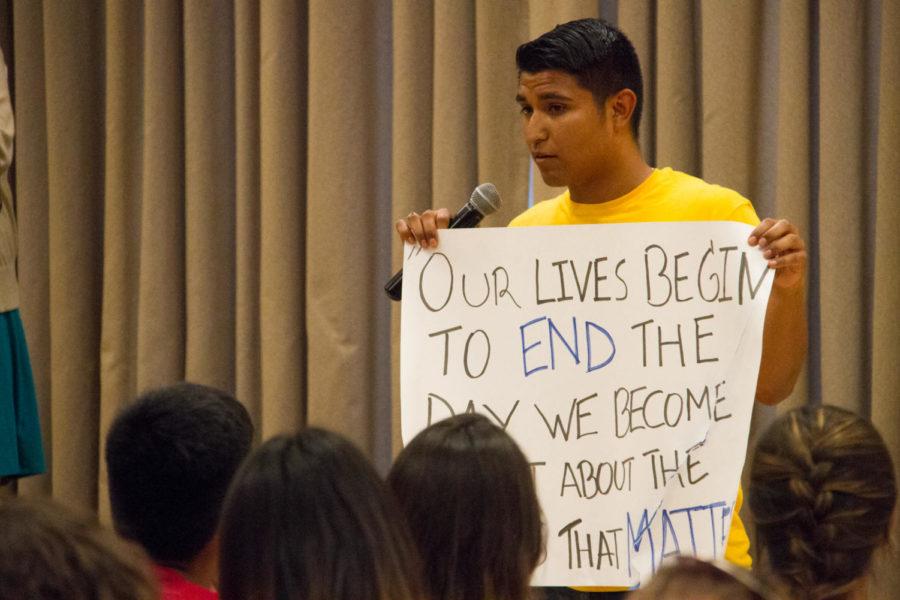Student Government looks to improve diversity on campus
Jovani Rubio, senior in mechanical engineering, holds up a sign with a quote from Martin Luther King, Jr. during a multicultural open forum Sept. 14. The sign was ripped by a woman Saturday during protest against Donald Trump.
October 13, 2015
Student Government is making sure the conversation on diversity continues at Iowa State.
In response to the recent debate on diversity, Student Government has drafted a resolution that would recommend five initiatives related to diversity to university administration. This bill will be discussed at the Senate meeting Wednesday.
The bill is in its fourth version after getting feedback from different individuals on campus and from the open forum Sept. 30.
Sen. Jane Kersch, one of the authors of the bill, said she wants this bill to “show that Student Government cares about diversity on campus and supports the students that have been affected by what is happening.”
“These students have very powerful stories, and if the university doesn’t act on them, that would be a huge failure on their part,” Kersch said.
Jazmin Murguia, director of student diversity for Student Government and a member of Students Against Bigotry, also gave feedback in the creation of the bill.
“I hope this will hold administration, staff, faculty and students accountable for what they are doing on campus, just being aware that there is a population on campus that does not feel safe.”
Kersch worked with a group of senators from Student Government, as well as a group of multicultural student leaders known as Students Against Bigotry. Vice Speaker of the Senate Michael Snook wrote and edited the current version of the bill.
“The goal of this resolution is to improve the experience for students on campus regardless of their background,” Snook said.
He said this bill is just a starting point and not a finite list of solutions.
Some of these initiatives are expanding on current programs. It calls for the implementation of a multicultural Safe Zone Program for faculty, staff, graduate assistants and student leaders.
A Safe Zone training program is already in place but is currently only for LGBTQ+ students. These zones offer a safe place for students to talk about their issues without fear. This bill would expand the program to other areas of diversity on campus.
A recommendation of a multicultural liaison officer and mandatory sensitivity training for ISU Police is also in the bill. Currently, there is only a LGBTQ+ liaison officer at ISU Police Department.
The resolution recommends the establishment of multicultural-based, non-residential learning communities for all colleges, not just the ones that are currently available. This would help retention in different colleges if students can be with others who share the same experiences as them.
An online diversity awareness course for incoming students would be implemented in the same manner that Title IX training and Alcohol Edu is administered to students.
“This [course] will give them perspective in how other students are feeling,” said Student Government President Daniel Breitbarth. “This will even the playing field so everyone knows what everyone else is going through.”
The bill also recommends the improvement of existing multicultural centers that are lacking in staffing and resources. Snook explained that the Latino multicultural center, which is located in Martin Hall, is very small, highly understaffed, lacks resources and not a lot of people even know it exists.
Not every senator on Student Government is entirely in favor of the resolution.
Sen. Brittany Gaura said she feels the timing of this bill is off.
“I feel it is very reactive,” Gaura said. “I am all for diversity on campus and everything they lay out, I just feel like this is very reactionary, that started with the events in September [the CyHawk game].”
Gaura said she is not 100 percent for or against the bill and has some questions that need answered.
Breitbarth said the whole goal is to help everyone grow as a community and make everyone better as a community.
“We didn’t want to just draft a resolution that says we support multicultural students, we wanted to propose solutions to better student’s experience and I think that’s what we are going to be doing with this resolution,” Snook said.







